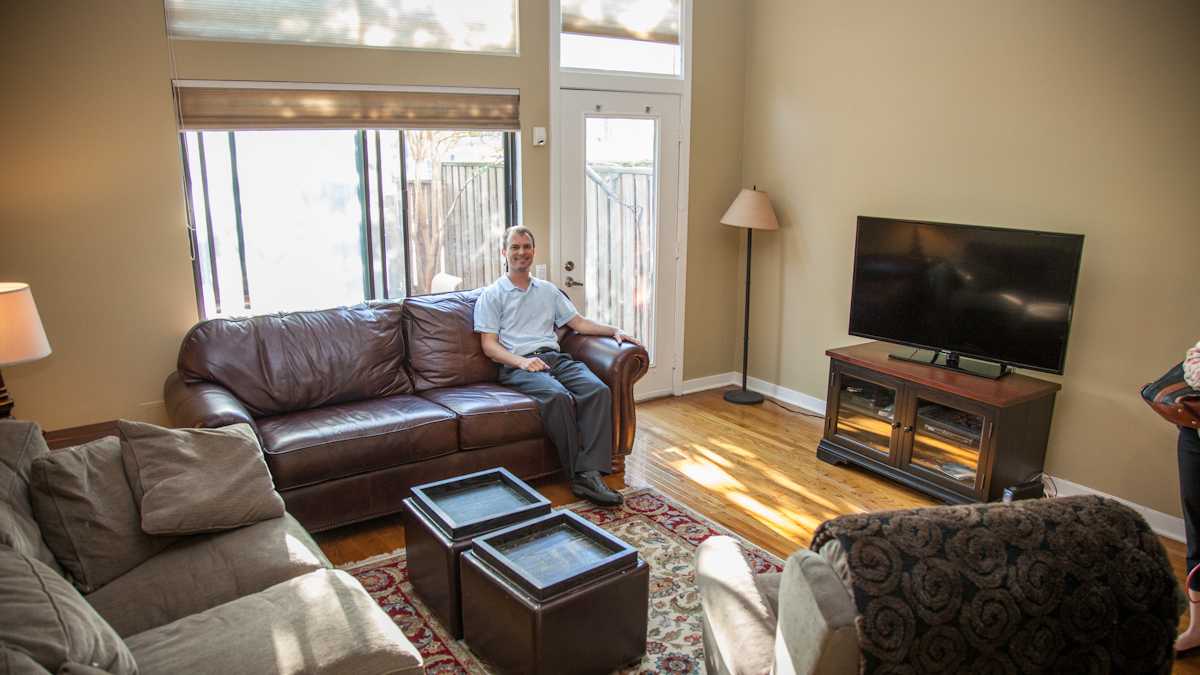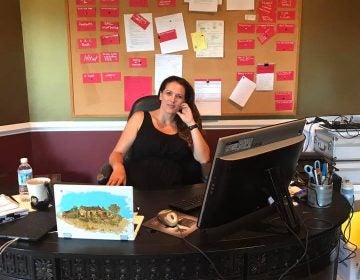How an ‘anti-Airbnb bill’ could benefit Philadelphia

A Philadelphia resident in the Art Museum neighborhood shows off his home
While a convenient option for travelers seeking a home away from home or individuals looking to make extra money, Airbnb has led to adverse impacts on business and city economies.
Recently the New York State Senate and Chicago City Hall passed bills that will prevent listings for illegal sublets — the business model that thrust Airbnb into the spotlight and enabled it to become one of the fastest-growing powerhouses in the technology and travel industries. The Anti-Airbnb bill, as it is publically referred to, has generated quite a buzz, stirring-up mixed opinions. While a convenient option for travelers seeking a home away from home or individuals looking to make extra money, Airbnb has led to adverse impacts on business and city economies.
While a bill of this sort has not yet reached Philadelphia, they are making their way through major cities, and the benefits for the city far outweigh the costs.
Following the rules
As the owner of luxury properties that accommodate both short- and long-term stays, my company went to great lengths to ensure the utmost safety for our guests. From state-of-the-art security, tax compliance, high-quality employment and proper licensing to the strict zoning regulations we applied for and were granted to operate a legitimate, successful business, there is nothing makeshift about our business model.
Whereas, tenants subletting apartments for short-term rentals are assuming the role of landlord, yet are not required to have insurance, certain fire safety features such as sprinklers and annunciators. Nor must meet ADA/accessibility requirements, which are mandated for occupancies of 30 days or fewer. What’s worse, 30 percent to 40 percent of Airbnb renters are corporate landlords looking to skirt the system and avoid paying hotel occupancy tax rates for short-term stays.
Additionally, many of the apartment and condo buildings in which transient stays are taking place do not legally permit these types of stays to protect the safety and privacy of residents, and consistently avoid new guests in the building. But because Airbnb is loosely regulated, and these rentals do occur in buildings not zoned for daily or weekly rentals, it can lead to a reduction in the supply of traditional apartments — those leased for one or more months at a time — thus driving up rental costs for apartments across the city as a whole.
If we have serious housing and occupancy laws, they need to be applied to all. One guest coming into this city is not more or less immune to life safety, fire safety, or accessibility, whether they stay at an individual’s home, a hotel, or an apartment. Therefore all should be held accountable for supplying the necessary protocols. If the state thinks these potential hazards are important enough to set a regulation, everyone should abide equally. Otherwise, zoning regulations become obsolete and any property zoned for rentals of 30 days or more could begin to operate as a hotel.
Missing tax revenue
In terms of tourist pull, the Philadelphia market is already less concentrated than that of New York, and the hotel industry is strategic in its outreach to potential visitors. Allowing Airbnb to operate the same way as Philly hotels, but without the taxes, causes the city to lose income it could use towards other city needs and services. Each city requires a hotel-occupancy tax that applies to hotels, motels, and bed and breakfasts, as well as condominiums, apartments, and houses rented for fewer than 30 consecutive days. The tax percentage varies from city to city, but the Philadelphia rate is currently 15.5 percent.
While this should also apply to Airbnb hosts listing their sublets for temporary stays, it is not the case. In 2015, the city of Philadelphia imposed an 8.5 percent Airbnb tax, but that still leaves 7 percent of Airbnb revenue untaxed. This resulted in tens of millions of dollars in potential taxes unpaid in 2015. Recently, with Philadelphia in the national spotlight as an emergent travel destination — and with major Airbnb spikes surrounding international events including the Papal visit last fall and the DNC this summer, the amount of unpaid tax dollars will increase drastically.
Considering the city’s budget deficit and recently imposed soda tax, turning a blind eye to this issue is only harming the citizens of Philadelphia, which has become the second most taxed city in the nation.
Trouble for hospitality
The rise of Airbnb has also led to job instability in the hospitality industry. Hotel employment is expensive, but very integral to the employment fabric of most major cities- as well as a necessity to attract strong tourism, conventions and events. On a national level, thousands of housekeepers were let go due to low occupancy, and many other employees were let go due to declining revenues. While new competition often affects industries, this time, in many cases, Airbnb visitors would rent places that were not professionally cleaned, and had no ADA room accessibility compliance or life safety code — both of which are required by law for the hospitality industry.
Airbnb has been integral in creating a culture of travelers looking to explore cities from the point of view of a local, and creating a home away from home in an unfamiliar city. People are taking more time for themselves, and placing more significant value on seeing how people in another city or another part of the world live.
I hope this continues — but in a way that compels Airbnb to abide by the same restrictions with which hotels and extended stay residences must comply. The diversification of the market is what drives healthy competition and moves the industry forward, but only if all parties are playing by the same rules. We need the city to ultimately tell us — all of us — what is important and what’s not when it comes to leasing, rentals, and short-term stays. Where can one stay for two days, weeks, months, or years. Once guidelines have been decided, they must be consistently upheld, and enforced.
—
Larry Korman is president & co-CEO of AKA by Korman Communities.
WHYY is your source for fact-based, in-depth journalism and information. As a nonprofit organization, we rely on financial support from readers like you. Please give today.


